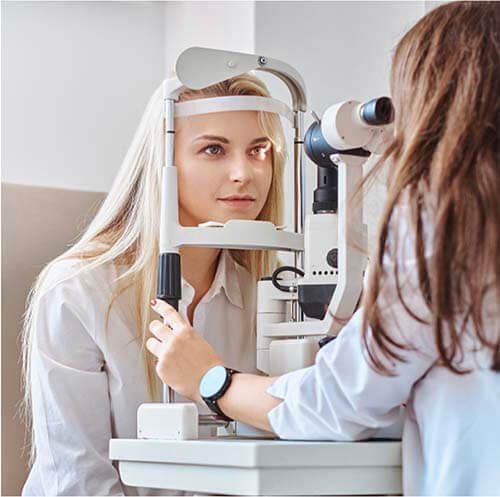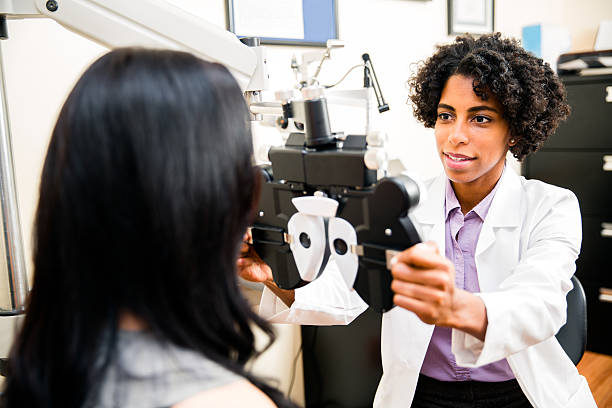The Relevance of Normal Eye Examinations: Insights From a Knowledgeable Optometrist
Routine eye exams offer as a critical element of healthcare that expands beyond simple vision adjustment. An experienced eye physician can provide understandings into just how these examinations not only identify typical eye problems however also expose underlying health concerns that may or else go unnoticed.
Benefits of Routine Eye Tests
Although numerous people may ignore the importance of routine eye exams, these analyses play a crucial function in keeping overall health and wellness and health. Regular eye evaluations serve not just to examine vision however likewise to spot very early indicators of systemic health issues, including diabetes mellitus and hypertension. By determining these problems at their beginning, patients can get timely treatments, significantly improving long-lasting results.
Furthermore, eye examinations can help in monitoring existing health and wellness concerns, ensuring that any modifications in vision or eye health and wellness are immediately dealt with (optometrist). The analyses permit tailored referrals regarding eyewear, lifestyle adjustments, and safety measures versus possible eye strain or damages
Beyond physical health, the benefits of normal eye tests include boosting top quality of life. Enhanced vision helps with much better efficiency in everyday activities, from reading to driving, thereby adding to greater independence and safety and security. Inevitably, focusing on eye tests cultivates an aggressive technique to health and wellness monitoring, equipping people to take charge of their wellness. Regular examinations are an important element of a detailed healthcare strategy, making certain that both vision and total health and wellness are preserved throughout life.
Common Eye Conditions Detected
Routine eye exams contribute in identifying a range of usual eye conditions that can significantly influence vision and general wellness. Among one of the most prevalent problems identified throughout these evaluations are refractive mistakes, including myopia (nearsightedness), hyperopia (farsightedness), and astigmatism. These problems commonly manifest as blurred vision and can be quickly remedied with prescription glasses or contact lenses.
Furthermore, cataracts, which create clouding of the lens, are frequently diagnosed in older grownups. This problem can lead to reduced vision and calls for surgical intervention for resolution. An additional usual issue is glaucoma, a group of eye conditions that harm the optic nerve, often linked to raised intraocular pressure. Early detection is vital as it can protect against irreversible vision loss.
Age-related macular degeneration (AMD) is an additional substantial problem that affects central vision, particularly in individuals over 50. Finally, diabetic retinopathy, an issue of diabetic issues, can cause severe vision impairment if not kept track of regularly. Through extensive eye exams, these conditions can be identified early, enabling for timely management and treatment to protect vision and improve lifestyle.
Significance of Early Detection
Early detection of eye conditions plays a vital duty in maintaining vision and stopping significant wellness issues. Numerous eye diseases, such as glaucoma, diabetic person retinopathy, and age-related macular degeneration, can proceed quietly without noticeable signs in their onset. By the time signs manifest, irreparable damage might have happened, leading to irreversible vision loss.
Regular eye tests promote early medical diagnosis, enabling for timely treatment and therapy. For example, dealing with elevated intraocular stress can avoid the start of glaucoma, while handling blood sugar level levels can significantly minimize the risk of diabetic retinopathy. In addition, conditions like cataracts can be successfully managed with surgical intervention when determined early.

Exactly How Usually Should You Go To?
Determining the regularity of eye tests is crucial for maintaining optimum eye wellness and vision. The basic suggestion for adults is to have a comprehensive eye exam every one to 2 years, depending on private danger factors and age.
Individuals with details threat factors, such as a family background of eye illness, diabetes, or existing vision troubles, may require even more regular evaluations. Youngsters must have their first eye test at six months old, adhered to by additional tests at age three and before getting in school. Normal examinations during childhood years are vital as vision can transform quickly during developing years.
Ultimately, the regularity of sees ought to be customized to each person's situations, consisting of way of life, occupational threats, and any type of pre-existing eye conditions. Consulting with an eye treatment professional can supply customized referrals, making sure that your eye wellness is consistently kept track of and kept.
Tips for Your Eye Exam
Planning for your eye exam can improve the efficiency of the browse through and make sure a comprehensive examination of your eye Website health. To maximize your time with the eye medical professional, it is essential to gather pertinent information prior to your visit. Beginning by compiling a list of any kind of drugs you are presently taking, consisting of non-prescription medications and supplements, as these can affect eye health and wellness.
Additionally, record any signs you have experienced, such as obscured vision, discomfort, or headaches. This information will help your ophthalmologist in detecting potential issues. If you wear glasses or contact lenses, bring them along, even if you don't wear them on a regular basis. This will certainly help the doctor assess any kind of adjustments in your vision.
It is additionally valuable to have a family members background of eye problems available, as genetic elements can add to your eye from this source health. Finally, consider arranging your examination for a while when you are less rushed, permitting you to ask inquiries and discuss your issues thoroughly. By preparing sufficiently, you make sure that your eye exam is productive and that your eye physician has all the essential information to offer the best care feasible.

Conclusion
Normal eye examinations play a crucial duty in preserving both vision and overall wellness. They help with the very early detection of various eye problems and systemic issues, permitting timely treatment. The referrals for frequency highlight the importance of positive care. Carrying out easy primary tips can improve the examination experience. Eventually, prioritizing detailed eye evaluations contributes significantly to the conservation of vision and the enhancement of lifestyle, highlighting the need of routine eye treatment in preventive health care approaches.
Normal eye exams are important in identifying a variety of common eye conditions that can considerably affect vision and total health.Identifying the regularity of eye tests is essential for maintaining optimal eye health and vision.Preparing for your eye examination can improve the performance of the visit and guarantee a complete analysis of your eye health (optometrist). have a peek at this site By preparing adequately, you ensure that your eye exam is productive and that your eye doctor has all the necessary information to offer the best care possible
Ultimately, prioritizing thorough eye analyses adds substantially to the preservation of vision and the enhancement of quality of life, underlining the need of regular eye care in preventive healthcare approaches.